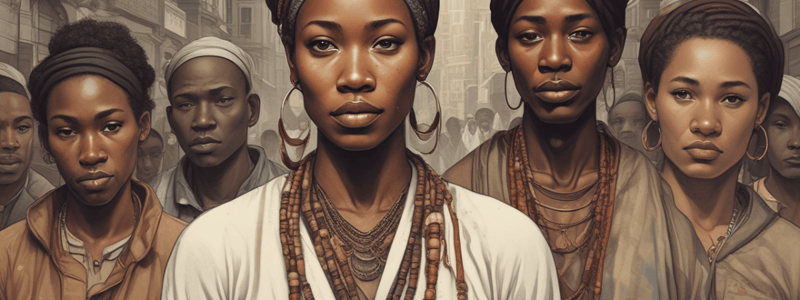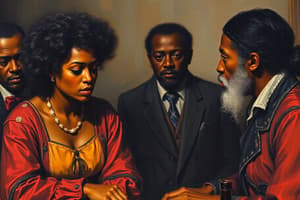Podcast
Questions and Answers
What is a key aspect of social class, according to the content?
What is a key aspect of social class, according to the content?
- It is solely based on occupation.
- It is unrelated to prejudice.
- It is relative and depends on the presence of lower classes. (correct)
- It is absolute and unchanging.
What phenomenon is related to people justifying their high social status by blaming the poor?
What phenomenon is related to people justifying their high social status by blaming the poor?
- Prestige Hierarchy Phenomenon
- Social Mobility Phenomenon
- Just World Phenomenon (correct)
- Status Quo Phenomenon
What is a possible consequence of the Just World Phenomenon?
What is a possible consequence of the Just World Phenomenon?
- Increased support for welfare programs.
- Increased social mobility for low-income individuals.
- Voting against welfare programs that aid the poor. (correct)
- Decreased prejudice against minority groups.
What determines prestige, according to the content?
What determines prestige, according to the content?
What is a characteristic of high-prestige jobs?
What is a characteristic of high-prestige jobs?
What is a consequence of the unequal status in society?
What is a consequence of the unequal status in society?
What is a racial group typically defined by?
What is a racial group typically defined by?
Why is skin color often used as a basis for prejudice?
Why is skin color often used as a basis for prejudice?
What is an ethnic group typically defined by?
What is an ethnic group typically defined by?
Why do minority groups often have limited control over their lives?
Why do minority groups often have limited control over their lives?
What is an example of how power can contribute to prejudice?
What is an example of how power can contribute to prejudice?
Why do Jews fit into the category of ethnic groups?
Why do Jews fit into the category of ethnic groups?
What is a key difference between racial groups and ethnic groups?
What is a key difference between racial groups and ethnic groups?
What can limit the sense of control that people have over their own lives?
What can limit the sense of control that people have over their own lives?
What is necessary for people to be of a higher status?
What is necessary for people to be of a higher status?
What is the assumption that people make about the world, according to the Just World Phenomenon?
What is the assumption that people make about the world, according to the Just World Phenomenon?
Why might people of a high social class justify their own position in society?
Why might people of a high social class justify their own position in society?
What type of jobs are often associated with high prestige?
What type of jobs are often associated with high prestige?
What is a potential consequence of the belief that people who are poor must be lazy?
What is a potential consequence of the belief that people who are poor must be lazy?
Flashcards are hidden until you start studying
Study Notes
Prejudice and Discrimination
- Prejudice and discrimination can be based on race, ethnicity, power, social class, or prestige.
- Racial groups are set apart due to physical characteristics that have taken on social significance, such as skin color.
- Ethnic groups are set apart due to national origin or distinctive cultural patterns, including groups like Puerto Rican, Irish, Japanese Americans, and Jews.
Power and Prejudice
- Power refers to economic and political power, as well as the power to control one's own life.
- Groups with a lot of political power can get their candidates in office, protect their interests, and limit the opportunities of minority groups.
- Unfair hiring policies and laws can limit the opportunities and sense of control of minority groups.
Social Class and Prejudice
- Social class is relative, and people of higher status need people of lower status to justify their position.
- The Just World Phenomenon assumes that the world is just, and people get what they deserve, which can lead to prejudice and discrimination.
- People of high social class may justify their position by stereotyping people who are poor as lazy, and voting against welfare programs that might aid them.
Prestige and Prejudice
- Prestige is often based on occupation, with high-prestige jobs going to dominant group members and lower-prestige jobs going to minority group members.
- Examples of high-prestige jobs include being a doctor or lawyer, while lower-prestige jobs include sanitation workers or service industry workers.
Prejudice and Discrimination
- Prejudice and discrimination can be based on race, ethnicity, power, social class, or prestige.
- Racial groups are set apart due to physical characteristics that have taken on social significance, such as skin color.
- Ethnic groups are set apart due to national origin or distinctive cultural patterns, including groups like Puerto Rican, Irish, Japanese Americans, and Jews.
Power and Prejudice
- Power refers to economic and political power, as well as the power to control one's own life.
- Groups with a lot of political power can get their candidates in office, protect their interests, and limit the opportunities of minority groups.
- Unfair hiring policies and laws can limit the opportunities and sense of control of minority groups.
Social Class and Prejudice
- Social class is relative, and people of higher status need people of lower status to justify their position.
- The Just World Phenomenon assumes that the world is just, and people get what they deserve, which can lead to prejudice and discrimination.
- People of high social class may justify their position by stereotyping people who are poor as lazy, and voting against welfare programs that might aid them.
Prestige and Prejudice
- Prestige is often based on occupation, with high-prestige jobs going to dominant group members and lower-prestige jobs going to minority group members.
- Examples of high-prestige jobs include being a doctor or lawyer, while lower-prestige jobs include sanitation workers or service industry workers.
Studying That Suits You
Use AI to generate personalized quizzes and flashcards to suit your learning preferences.



